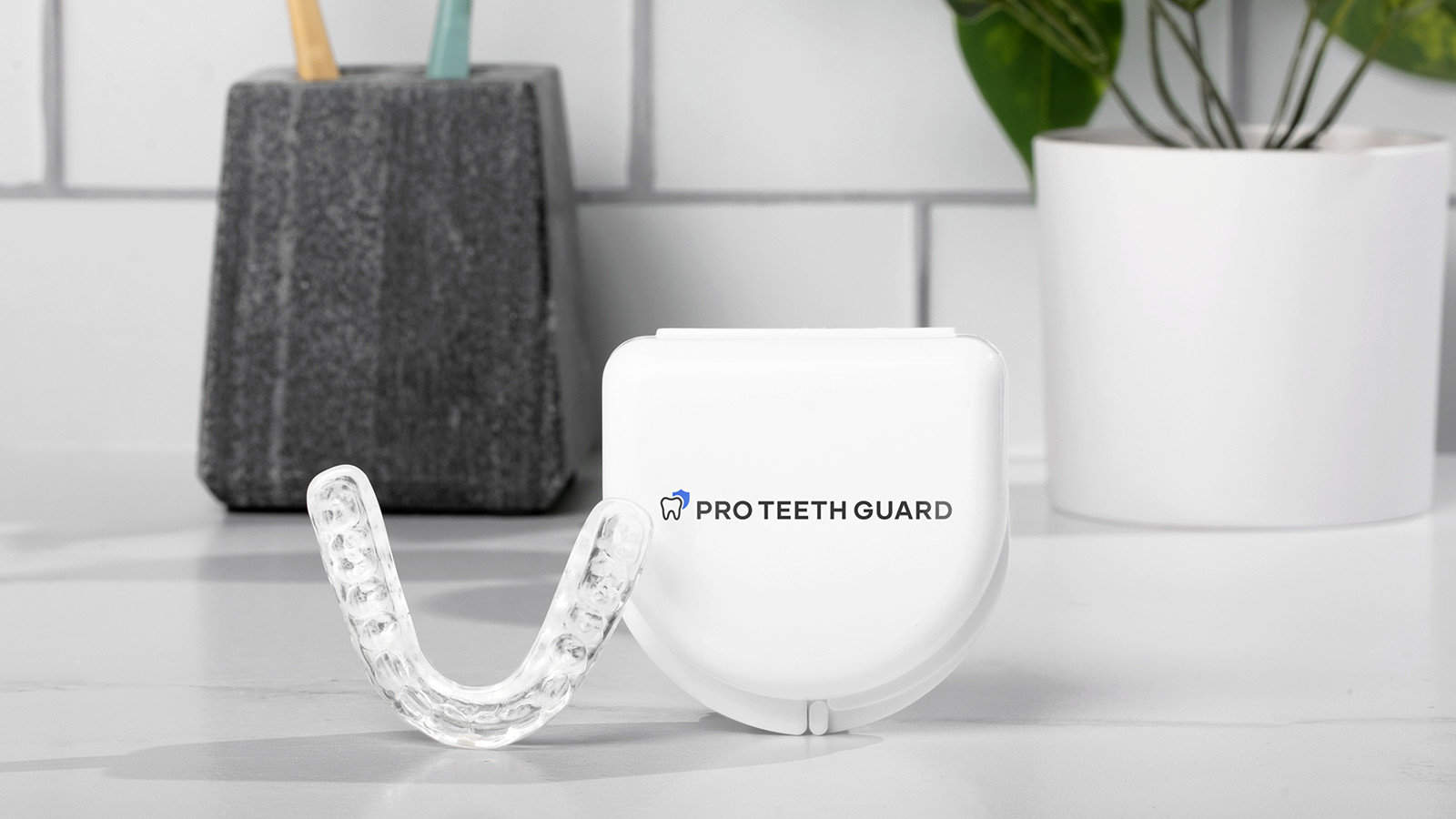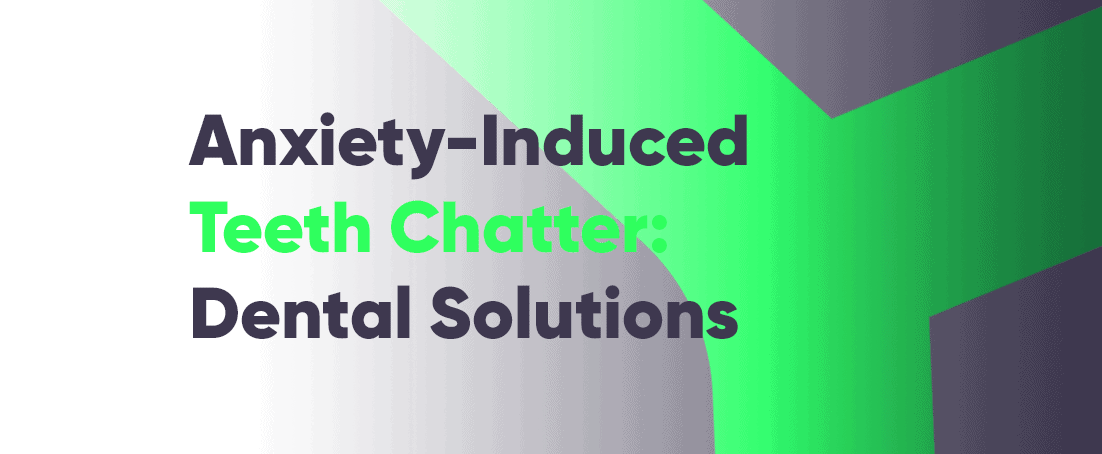In the realm of unexpected body reactions to worry, involuntary teeth chattering stands out as a lesser-discussed but significant symptom. It’s perplexing how one’s teeth can chatter seemingly on their own, regardless of the outside weather.
The Anxiety & Depression Association of America (ADAA) attributes this unusual phenomenon to anxiety-induced muscle strain. It can result in teeth grinding or clenching. As a physical symptom of stress, this tension extends to the jaw muscles, causing teeth to chatter involuntarily.
While it may appear strange, this body response is a strong symptom of underlying anxiety. Understanding its relationship to stress is the first step toward properly resolving it.
Table of Contents:
Chattering Caused by Stress: What are the Reasons Behind It?
We at once assume it’s the cold weather causing you to shiver, which is normal when your body is trying to warm. It’s not true because several reasons can cause the involuntary tension of your muscles in the jaw. We shall go through these causes below.
1. Experiencing High Levels of Anxiety
Anxiety is the primary culprit of teeth clattering, according to our research. This, combined with stress, causes muscle tension, especially in the jaw muscles. It’s a natural reaction to worry about either work or life.
Social anxiety is a common reason for chattering. When someone is afraid of people judging them, the face and jaw muscles contracting and getting all tensed up is very common. We recommend you talk to your health provider about how you can treat your anxiety.
2. Medications Side Effects
Some medications are responsible for chattering. Antipsychotic medicines like serotonin reuptake inhibitors (SSRIs) are known to cause this symptom. Other medicines like Zoloft that affect the central nervous system can also cause tremors or jaw clenching, leading to chattering.
3. Taking Excess Caffeine
Caffeine is a stimulant that causes chattering as a stress symptom. Higher intake causes muscle tremors or jaw spasms, especially those in the jaw, which can result in teeth chattering at daytime. Chattering cases are related to either reducing or completely taking away caffeine. Caffeine is a strong psychoactive drug that’s involved in the production of dopamine and adenosine.
4. Withdrawal from Alcohol
Excessive alcohol consumption can influence the central nervous system. It generates tremors and involuntary muscular movements, which can manifest as chattering. You get the tremors because your brain got used to the dopamine from the drugs. The moment you withdraw yourself from the drug means your brain has to compensate for the absence of the drug it was dependent on. It’s this time when you have the spasms making your teeth chatter.
5. Smoking Nicotine
Nicotine is a stimulant found in tobacco. It can increase muscle tension and tremors, notably in the jaw muscles, causing teeth to chatter in certain people. You can avoid smoking to prevent teeth chattering caused by stress.
6. Extreme Cold Weather
Extreme cold can cause a physiological response, such as shaking and chattering of teeth, as the body tries to generate heat. When the body temperature gets lower than the surrounding temperature, your body responds by shivering, which causes the lower and upper parts of your mouth to excessive movement.
7. Neurological disorders
Neurological disorders cause disruptions in the brain’s control over muscle movements. The underlying neurological dysfunction leads to the manifestation of teeth chattering.
Flight or Fight Responses and Chattering Teeth
Anxiety triggers the body’s “fight or flight” response, a primitive response developed to deal with imagined dangers. In this state, adrenaline levels rise, muscles strain, and the neurological system goes into overdrive. Because of the increased stress, the jaw muscles can automatically clench and release, resulting in teeth chattering.
Historically, this is a necessary response for survival in times of acute danger, while it’s also a symptom of persistent stress or worry. The response to this is anxiety-related symptoms, such as teeth chattering. Understanding this theory may help you obtain appropriate treatment for a healthier stress response.
Anxiety and Its Role in Teeth Chattering
Teeth chattering, often dismissed as a mere nervous tic, reveals a nuanced connection to various anxiety disorders. Among these include:
- Generalized Anxiety Disorder (GAD): In GAD, persistent and excessive worrying can lead to physical manifestations like chattering and tooth pain.
- Social Anxiety Disorder (SAD): SAD, characterized by intense fear in social situations, may provoke nervous habits such as anxiety teeth chattering.
- Post-traumatic Stress Disorder (PTSD): Individuals with PTSD, often haunted by traumatic experiences, may exhibit chattering as a stress response.
Chattering teeth may not be exclusive to these disorders. However, it serves as a potential indicator of heightened anxiety levels. It further underscores the intricate relationship between mental health and physical manifestations.
ADHD-related bruxism emphasizes the intricate relationship between mental health and physical expression. The emerging link between ADHD and bruxism, teeth grinding, adds complexity, hinting at a broader interplay between anxiety and neurological conditions. It further underlines the importance of holistic mental health assessments.
Medication Interactions Exacerbating Teeth Chatter
Certain medications prescribed for anxiety or related conditions can exacerbate teeth chattering in adults. Those particularly affecting the central nervous system may inadvertently contribute to jaw-related symptoms like bruxism, increasing the likelihood of teeth chattering.
Medications with stimulant effects, often prescribed for attention-deficit/hyperactivity disorder (ADHD), can heighten nervous system activity. It intensifies teeth chattering in susceptible individuals.
Healthcare providers need to monitor and adjust medications to minimize adverse effects on oral health. Also, they should recognize the nuanced relationship between pharmaceutical interventions and the manifestation of physical symptoms such as teeth chattering.
Tackling Chattering Anxiety for Dental Health
Teeth chattering caused by anxiety is not pretty or normal, and that’s why you need to find solutions for it. For instance, you can:
- Alleviate teeth-chattering anxiety by using night guards. That’s why dentists often advise to use night guards. These custom-fitted dental appliances act as a protective barrier, preventing the grinding or clenching of teeth that commonly accompanies anxiety.
- Stress management techniques such as mindfulness, meditation, and relaxation exercises can help reduce overall anxiety levels. They diminish the likelihood of teeth chattering in patients and save your wisdom teeth from damage.
- Cognitive-behavioral therapy (CBT) may also be beneficial in addressing the root causes of anxiety.
- Maintaining a consistent sleep routine and avoiding stimulants can improve your oral health.
- Consulting with both a dentist and a mental health professional provides a holistic approach to tackling teeth chatter anxiety effectively.
Deep Breathing and Mindfulness in Controlling Dental Stress
Deep breathing and mindfulness can help reduce anxiety-related teeth chattering. Let’s take you through this exercise for relieving anxiety and chattering.
- Begin with a gentle breath through the nose, allowing the abdomen to stretch.
- Repeat the first step, concentrating on each breath. Stay present in the moment and shift your focus away from worrying thoughts by practicing mindfulness.
Individuals can build a peaceful mental state by embracing these activities. They help stop the cycle of anxiety-induced teeth chattering for a more grounded sense of well-being.
Cutting Out Stimulants to Reduce Chattering Teeth
The stimulating properties of caffeine and other stimulants can amplify muscle tension, exacerbating this anxiety-related discomfort. To solve this problem of teeth chattering, you need to replace caffeinated beverages with healthy options. For example, herbal teas provide relaxation while maintaining attention.
To support a tranquil nervous system, do the following:
- Drink enough water.
- Use herbal infusions.
- Use decaffeinated beverages.
Eliminating stimulants helps with teeth chattering and promotes overall well-being, fostering a calm and serene condition.
Night Guard Solutions for Teeth Grinding
Investing in a night guard can help reduce the impact of involuntary teeth chattering in sleep and other difficulties.
- Involuntary Teeth Chattering
Involuntary teeth chattering often occurs even without an external trigger, such as cold temperatures. This physical manifestation is commonly associated with heightened emotional stress, anxiety, or certain medical conditions. A night guard serves as a protective barrier for persons with teeth chattering while sleeping, reducing the risk of tooth damage.
- Bruxism at Night
Night guards operate as a buffer against bruxism, minimizing the negative effects of teeth grinding while sleeping, such as enamel wear and jaw discomfort.
- Cheek/Tongue Biting at Night
Night Guards act as a barrier, lowering the chance of unintended cheek or tongue biting during episodes of teeth chattering while sleeping.
- Alleviates Muscle Tension
Night guards help decrease muscular tension by offering a cushioning effect. They contribute to a more relaxed jaw and lower the physical manifestations of stress during sleep.
- Protects Against Tooth Damage
Night guards shield teeth from the possible harm caused by involuntary teeth chattering, protecting dental health for a patient.
- Prevents Headache
Reducing the strain on jaw muscles and decreasing teeth chattering can help prevent tension headaches.
- Helps with TMJ Disorder Symptoms
Individuals experiencing symptoms associated with TMJ disorders can benefit from Night guards. They promote proper jaw alignment and reduce strain, which causes issues like jaw pain, headaches, etc.
Our favorite night guards, designed with comfort and effectiveness in mind, provide a tailored solution for those seeking protection and relief. Prioritizing oral health through a quality night guard ensures a restful night’s sleep and protection against the potential repercussions of nocturnal bruxism.

Able to sustain even an extremely heavy grinding, Pro Teeth Guard is guaranteed to stop your tongue biting.
- Many thickness options
- Well-constructed impression kit
- Fast shipping
Choosing Pro Night Guard for Bruxism
If you’re looking for a reliable dental solution for teeth grinding and clenching, Pro Night Guard is what you need. The Pro Night Guard earns praise for contributing to a restful night’s sleep. Explore its advantages in our detailed Pro night guard review. It’s a favored choice for those seeking a reliable and comfortable remedy for nighttime teeth grinding. They are the answers to your bruxism challenges.
Opting for Chomper Labs for Teeth Protection
Are you looking for an effective and durable mouthguard? Chomper Labs custom mouthguard users laud its durability and effectiveness in preventing teeth grinding and clenching. This succinct Remi custom mouth guard review dives deeper into its strengths. This product is your solution for oral protection and comfort.
The Significance of Mouth Guards in Preventing Teeth Chatter
Using occlusal mouth guards is crucial for individuals seeking to address and prevent teeth from chattering. These custom-fitted guards offer a range of benefits, contributing to overall oral health and well-being.
- They help minimize the effects of bruxism, providing a protective barrier that prevents teeth grinding and involuntary chattering.
- Assist in alleviating muscle tension, reducing the risk of dental damage. It helps prevent headaches associated with teeth grinding and promotes proper jaw alignment.
Incorporating a mouth guard into your oral care routine is a proactive and effective measure of “how to stop teeth chattering.”. It helps ensure a healthier and more relaxed dental state.
Overcoming Involuntary Teeth Chattering with Expert Solutions
Involuntary teeth chattering, despite its annoyance and occasional embarrassment, can be effectively addressed with practical solutions.
One way is using night guards, recommended by dentists, to serve as protective barriers against grinding and clenching.
The other is stress management techniques like mindfulness and relaxation exercises. When you’re anxious,they contribute to anxiety reduction, mitigating the root causes of teeth chattering and muscle spasms. Additionally, cognitive-behavioral therapy (CBT) offers valuable insights to stop chattering anxiety.
Other solutions are consistent sleep routines and minimizing stimulants . They aid in overall oral health and improve your lifestyle. While involuntary teeth chattering may pose challenges, embracing these solutions ensures a proactive approach to effective management and improved well-being.

